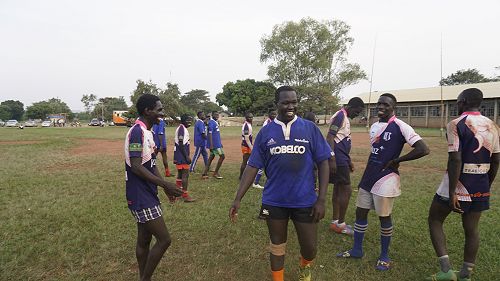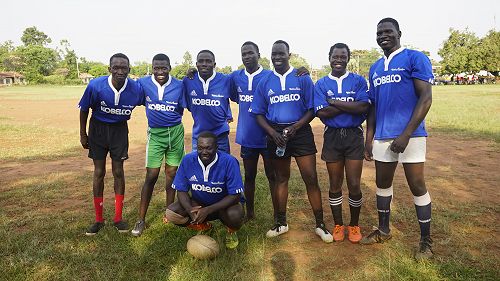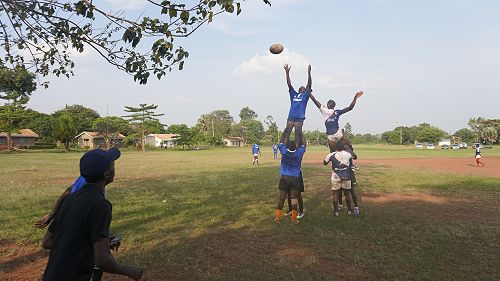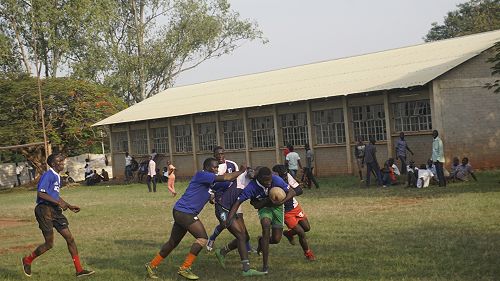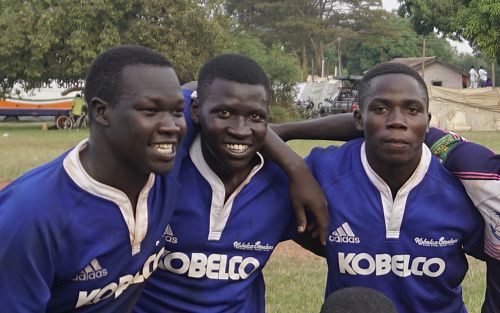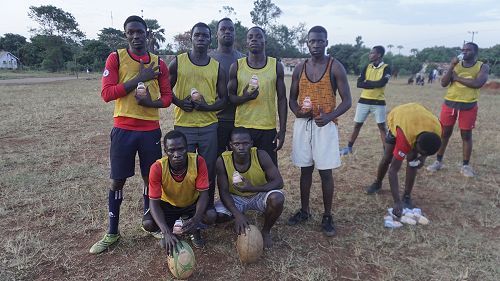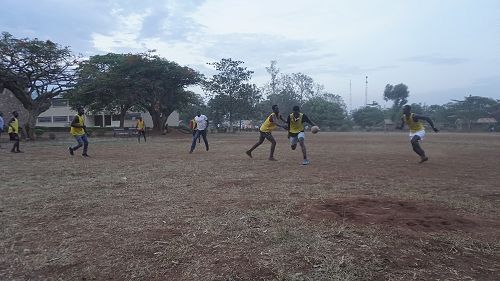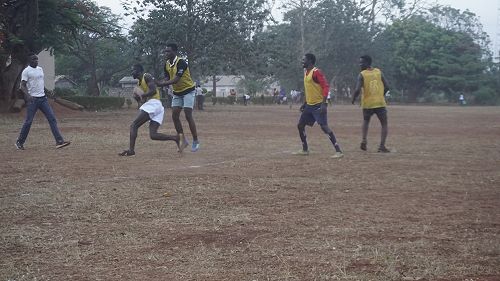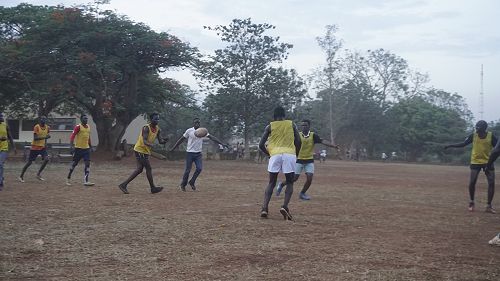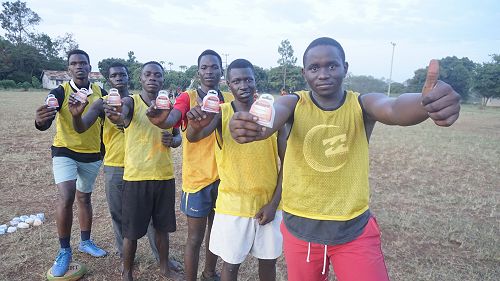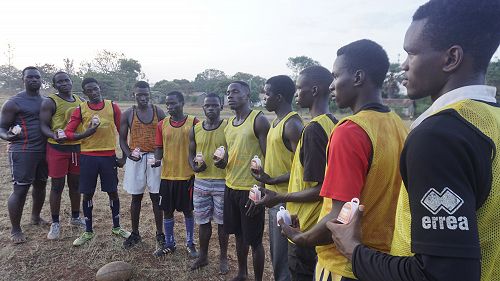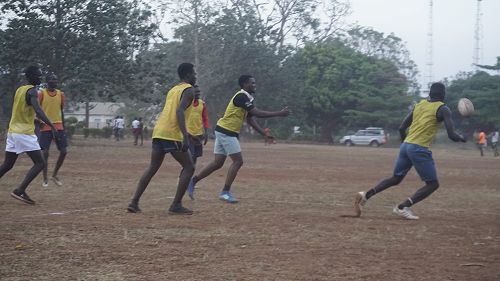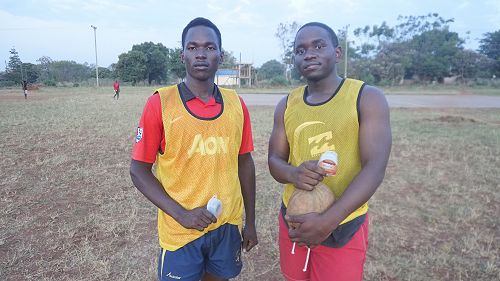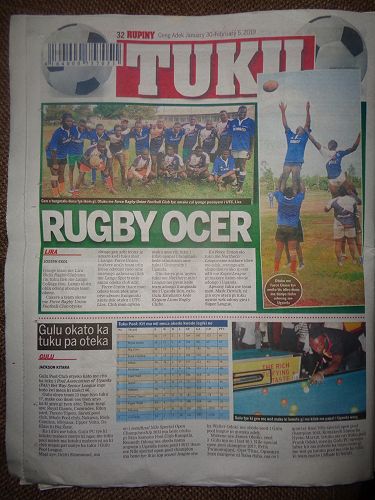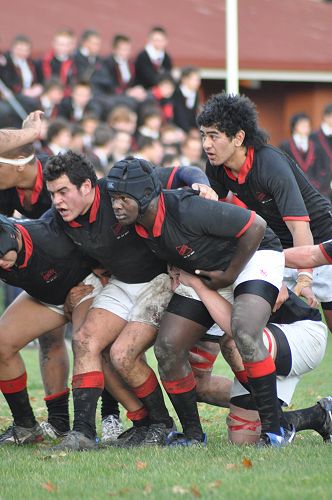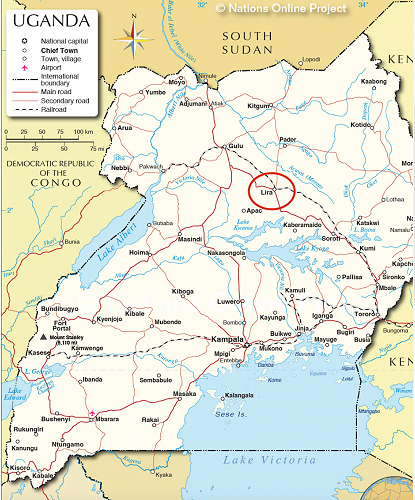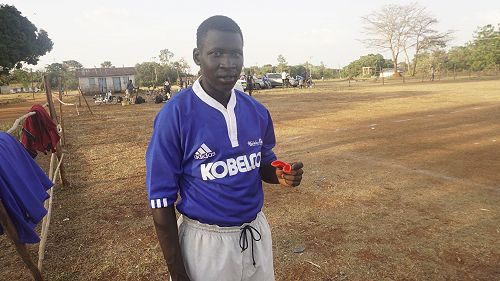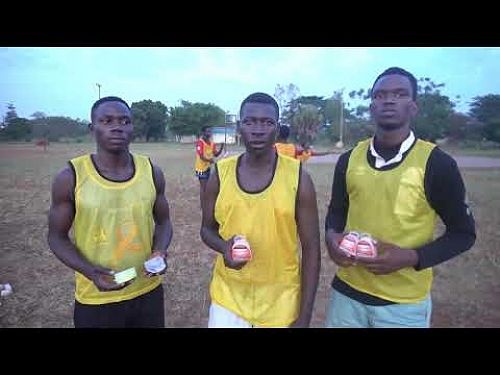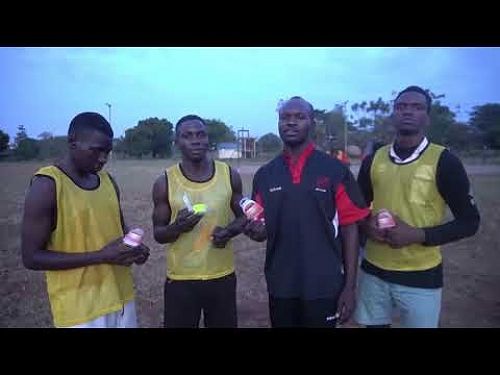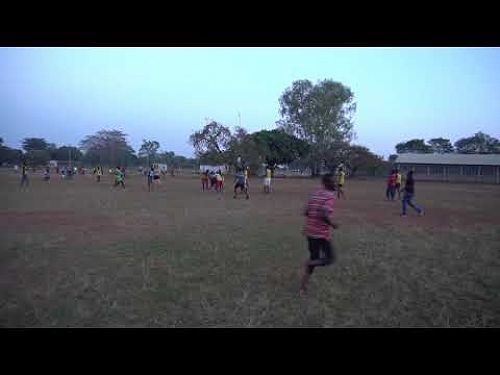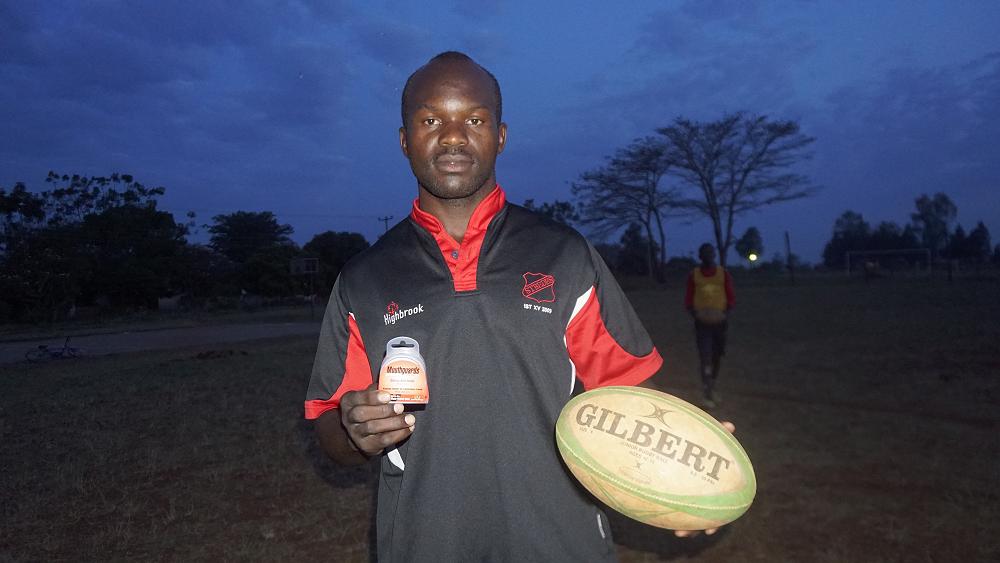
Former 1st XV player Coaching in Northern Uganda
RUGBY AS A VEHICLE FOR ECONOMIC AND SOCIAL TRANSFORMATION IN NORTHERN UGANDA
Mark Ocwich comes to St. Bede’s College
In 2009 St. Bede’s College continued its engagement with rugby on the African continent by partnering with the Ugandan RFU to bring Mark Ocwich into the International Rugby Programme, on the understanding that after returning to Africa he would “put back in” to Ugandan rugby. Before Ocwich came to Christchurch, the College had already hosted boys from Kenya, Zimbabwe, the Cameroon, Ethiopia and South Africa, so was well used to having African young men bringing diversity to the Bedean community mix.
Tim Webster, who was involved in community level youth rugby development here in Canterbury, as well as charity work in Uganda, served as a valuable intermediary in the process of choosing the right young man to come to St. Bede’s. The idea was to select someone for whom the experience in a very different world would not be a destabilizing one, in other words that the player would see every moment in New Zealand as preparation for the challenge back home. Tim chose exceptionally well. When World Rugby (then the IRB) sent a film crew to interview Mark Ocwich at St. Bede’s against the backdrop of Marist House and Durham Boarding House, his quietly spoken but carefully chosen words and the steely look in his eyes were unmistakable - every comment Ocwich made reflected his understanding of his mission.
“The thing that became apparent with Mark very early on was his understanding of the responsibility the opportunity he was being given carried,” says Tim, “Yes, he was at St. Bede’s to improve his own game, which he did in spades, but he was also there to absorb as much rugby coaching wisdom as possible to take home with him. What this remarkable young man has achieved since his return to Uganda is truly humbling. If there is a better testament to the impact of the IRP, I have yet to see it.”
IRP Director Mark Ealey recalls, “I remember Mark as being quiet, sincere, mentally tough and very hard-working. In a word, I think people who got to know him that year would describe him as being ‘driven’. Every time he nodded his understanding of something at IRP training sessions I had a feeling that before too long, what we had just done would be re-enacted on a practice ground in Uganda. I remember being thoroughly proud of him when he ran out of the sheds for his cap game against Christ’s College.”
“Putting back”
In 2016, seven years after his International Rugby Programme experience at St. Bede’s College, where he played loosehead prop for the 1st XV, and after having retired from playing, Mark Ocwich started on that mission to “put back” in the Lira District of Central Northern Uganda, about 200 km from the border with South Sudan. Mark decided to return to his homeland determined to use rugby as a vehicle to contribute to the economic and social rehabilitation of the traumatized communities affected by more than two decades of terror at the hands of Joseph Kony and his rebel group the Lord’s Resistance Army. Thousands of people were killed during Kony's reign, with more than 1.7 million being forced to flee their homes. As many as 20,000 Ugandan children are thought to have been abducted to be used as child soldiers or sold as sex slaves.
Northern Force RFC
Despite developing against a background of such difficult circumstances, the Northern Force RFC is now an officially registered company which uses a range of innovative approaches in order to survive. In terms of playing roster, it has a junior (U14) tag-rugby team, a youth team, as well as senior men’s and women’s teams, with a total of more than 70 people participating in its activities. There are many “street children” involved, so these kids help to spread the rugby gospel to their friends, bringing in more new faces to the training ground almost every day.
The Northern Force is the only rugby club in the Lira District and it is open to anyone who wants to give rugby a go. While there are pockets of players in the various far flung regions around Uganda, the Northern Force seems to be setting the standard for how a small regional club can attract people for the right reasons and survive as a result. It is still a far cry from the well-established clubs in Kampala such as Kyadondo RFC, which have impressive facilities with income-generating operations, but it is making small steps in the right direction. Ocwich is reaching out to other similar clubs in neighbouring countries and has established ties with the likes of the Remera Buffaloes RFC in Rwanda. Cooperating and swapping notes with people in such clubs outside Uganda will no doubt be of mutual benefit moving forward.
But if the truth be known, it took some time for Ocwich to settle back into the Ugandan rugby system. He reflects on early frustrations, saying, “One of the things I learned quickly upon my return to Uganda was that the wheels of officialdom move slowly and, in order to get anywhere, one must be patient yet persistent. This is particularly true when an enthusiastic youngster challenges the status quo. Now, after a number of years banging on the door, things are finally beginning to happen, and I have learned more life lessons than I care to mention.”
Club make-up
Asked to comment on the range of players in the Club, Ocwich said, “The U14s are the most rewarding group for me. Many of them are “street children” who have been rehabilitated with a positive mindset. Now, thanks to their involvement in the Club, they want to lead a decent life like their team-mates from normal homes who attend primary school. It has been amazing to witness how rugby has been instrumental in shaping their lives. They may still sleep rough on street verandas and go through each day without proper meals, but their newfound feeling of belonging to an organization created with the goal of positively influencing people’s lives has seen them become responsible members of local society. The joy these children display on the field with ball in hand honestly makes me believe that rugby wipes their problems away, at least for the short time when they are out there playing.”
The more capable members of the U21 team often play in the senior men’s team, but regular schools tournaments organized by the Force RFC usually keep the players in the junior section busy.
Early difficulties
When the Club started in 2016 there were several former players involved who were difficult to manage, something that had even seen other clubs collapse. Sidelining these older, uncontrollable players was a significant challenge for Ocwich. There were serious anti-social, behavioural issues to deal with among the “experienced” players. These men were part of the community and difficult to avoid; the most disruptive individuals even persuaded some of the players not to participate in the team, creating a very difficult situation for the club in the early years. For a while, the Northern Force teetered on the brink of failure, barely operational, but Ocwich and several players who understood his ethos were determined to succeed whatever difficulty. Every setback was viewed as a valuable lesson to be learnt. With this the case, the players who had quit the team returned when they realized they were only jeopardizing their own opportunity for self-development. Ocwich says that he thinks that his unwavering focus on the Rugby’s core values of Respect, Integrity, Passion, Discipline and Solidarity helped bring stability to the Club and credibility to those known to be involved.
Lessons learned at St. Bede’s
He reminisces that the values learned in the International Rugby Programme and in the St. Bede’s 1st XV under Gerry Davidson and Mark Vincent stood him in good stead when he took up the challenge to create a club from scratch. “I learned so much from really good, dedicated people during my time at St. Bede’s. I realized the true significance of those learnings when I started to set up the Club in difficult circumstances.”
Gerry Davidson, Ocwich’s 1st XV coach and former NZ Schools coach, comments, “Mark stands out as a player who made tremendous progress during his time at St Bede’s. To go from a limited rugby background in Uganda to the National Secondary Schools finals in New Zealand in the space of six months could only have been achieved by determination and a total commitment to his team and personal development.”
That determination and total commitment that Gerry Davidson refers to stood Ocwich in good stead when he got back to Lira District on his mission to set up the Northern Force. He started by gaining access to a local school field and, incredibly, within just a few months, was able to create a functioning team. Except for one rugby ball that he had brought with him from Kampala, Ocwich had no equipment or playing gear to begin with, so the task was certainly not for the faint hearted. Nevertheless, he mentored the boys, teaching them the core values of rugby that he had learned at St. Bede’s and, slowly but surely, gained the attention of the public so more people started to turn up to play and watch.
Men’s team captain Brian Okello sums things up well saying, “It is a young team with great potential to grow and enhance the lives of its members and the people in the community in general. The Club is helping to create a sense of unity and team-work among our youth, children and adults.”
Recruitment and fund-raising
Once things settled down, Ocwich dedicated an increasing proportion of his efforts to getting more people into rugby and creating income-generating activities to sustain the Club moving forward. Now the Force has partnered with local schools and institutions to promote active participation in rugby by the local youth, so the talent pool currently draws upon students from eight senior schools and two institutions in the Lira, Oyam, Aduku and Kole areas of Northern Uganda. Engaging with these educational institutions is costly and demanding. The Club must provide them with coaching and train their staff so they can hold safe sessions unsupervised and must offer appropriate equipment and training gear. There is also cost incurred in organizing tournaments, etc. but of course there is no way around this, so Ocwich and his helpers improvise and somehow get by.
In 2013, Ugandan government introduced the Youth Livelihood Programme, targeting poor and unemployed youth in an attempt to harness their social-economic potential and increase self-employment opportunities and, ultimately, to lift income levels. As a club, the Northern Force does not yet have the capacity to pay its members, so it has created an association designed so that all of the Club members (players, fans, administrators, well-wishers) will benefit. Hopefully, by 2020 they will be generating income from the likes of poultry farming. If they can, they will be able to improve the lives of the local people and operate the Club with greater ease.
Help from overseas
In the last few months well-wishers overseas such as Mark Ealey and Tim Webster in Christchurch, New Zealand and Nick Ealey in Kobe, Japan have offered tangible support, sending the Club gear such as a set of jerseys (donated by Kobe Steel RFC), balls, bibs, socks, coaching resources etc. Ocwich says, “This has greatly helped to promote rugby in Northern Uganda. With this gear the Northern Force is now able to compete more effectively in competitions and also to attract more people into rugby by holding more frequent trainings and rugby clinics.” Kobe Steel player Nick Ealey (2006 1st XV) commented: “I have never actually met Mark, but I had always kept an eye on St. Bede’s rugby since graduating, so I knew of him. After hearing Mark’s story I knew I had to contribute, so with the help of my team the Kobe Steelers, and a few generous donations from team mates, we gathered jerseys and sent them to Lira in Uganda. Seeing photos and a video of the players wearing these jerseys and the joy on their faces has me wanting to keep contributing to the Northern Force in some way in the near future.”
Funding & operations
Currently, the main source of the Club’s income is funding Ocwich can source. The Club does not yet have any sponsorship or any business activity generating money, but they are hopeful that by 2020, the Northern Force will be in better financial shape, generating small funds from business ventures such as selling eggs from poultry. Such money can be used to support the welfare of players, purchase medical supplies and to cover other costs such as transport. Ocwich says, “We are trying to reduce costs as much as possible, which does affect the performance of the Club, but our hands are tied until we secure funds to support the Club’s activities.”
The Club office, located in the Lira Central Municipality, serves as the main co-ordination center of all activities, with about nine “employees” being stationed there performing different tasks. In addition to the Club’s staff working at its office and out on the grounds, it has a Schools’ Rugby Patrons Committee comprising of about eight members who help manage and liaise with the various schools.
The Club’s long-term plan is to cover all the whole Northern Region district and provide opportunities to children, youth and marginalized people, both as players and as fans to help them in their lives.
The Northern Force RFC is challenged by the lack of a skilled and reliable labour force. Ocwich says, “A strong club with a competitive team is actually relatively straightforward to create, but specialized manpower is needed to make it sustainable. Unfortunately, getting such employees is not easy in Uganda. Some usually leave their roles with us in search of better lives after receiving training since the Club has no funds to pay employees which of course affects our operations.” So, with this the case, rather than as employees, the Club engages them as volunteers to assist with handling its operations. In return, the Club assists them with transport where necessary, hoping to help lead them to a brighter future.
The Club currently does not have its own field on which to base its rugby-training and playing activities, so it liaises with schools or institutions or uses community fields. This of course means that it faces competition from other football sports like soccer which also need the same fields. In the dry season, most fields dry up due to poor maintenance, but if the Club were to have its own ground, it would be able maintain it to a playing standard all year round and to develop and carry out a greater range of activities and offer more opportunities for the local community.
Ocwich says: “We have been fortunate to receive a small amount of gear such as jerseys, balls etc. from well-wishers around the world, and as a result, the Club now can operate more or less normally. But we still lack so much, especially safety-related equipment such as hit shields, shoes, goal post pads, tackle bags etc. We are hopeful that by 2020 when the Club can generate some funds, we shall be able to put in place this sort of equipment, but for now we are at God’s mercy to keep us safe from avoidable on-field accidents.”
Coach Peter Lang, who has well-established ties in East Africa says, “One of the (many) challenges that Mark faces is that Uganda is a vast country and rugby is only really “known” in the larger cities close to Kampala, the capital. Mark and I talked about the massive opportunity to grow the game in other regions and how much potential talent is lying dormant in these regions waiting to be awoken. Through Mark’s efforts, along with a few others, the game is growing in popularity and this can only bode well for rugby in Uganda, at the school, club and national levels.”
Peter continues: “Watch out for Uganda Rugby, it is about to explode on the world rugby stage and it will happen because there are people like Mark O putting everything (practically his shirt off his own back) to help other people realize their potential and to not let their dreams have limitations of money, opportunity and resources. It will also happen because there are people like Mark Ealey and Tim Webster who do what they can to help, so my question to others is ‘What can you do to help?’ - don’t wait for others to tell you how you can help, get creative and get involved.”
When asked “Do you know Dan Carter?” (who helped Nick Ealey send the Club a set of jerseys from Kobe in Japan), the players said: “Yes, we certainly do know him! We feel very inspired, proud and motivated to perform well every time we wear the Kobe jerseys. At the same time we know that we must be cautious and respectable in our behaviour, so as not to bring any level of shame to the reputation of those who associate with us.” It’s great to know how Mark Ocwich’s championing the core values of rugby is impacting so positively on the lives of the people in the Lira District of Northern Uganda.
Keep up the good work Mark!
SOME FACTS ABOUT UGANDA: A member of the British Commonwealth since 1962, Uganda shares its borders with five countries: Rwanda, Tanzania, Kenya, South Sudan and the Democratic Republic of Congo. Although it is a landlocked country, it has many large lakes; in fact about one-quarter of Uganda’s surface is made up of lakes and rivers. The south of the country is heavily influenced by one of the world's biggest lakes, Lake Victoria, which contains many islands. In terms of population, Uganda is the second largest landlocked country in the world. One third of Ugandans are Roman Catholics. Approximately half of Ugandans live on less than one US dollar per day. The Ugandan RFU was formed in 1955 with the first international match, against Kenya, being played in 1958. Its men’s national team, known as the Cranes, is currently ranked 42nd in the world, just below Zimbabwe and Tunisia and above Sri Lanka and the Ivory Coast.
Gallery
